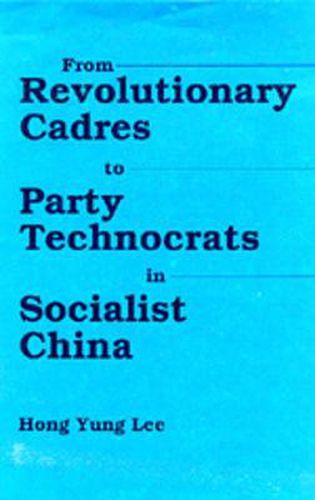Readings Newsletter
Become a Readings Member to make your shopping experience even easier.
Sign in or sign up for free!
You’re not far away from qualifying for FREE standard shipping within Australia
You’ve qualified for FREE standard shipping within Australia
The cart is loading…






Using a wide variety of sources previously unavailable, Hong Yung Lee offers for the first time a theoretical and historical perspective on China’s ruling elite, examining their politics and the bureaucratic system in which they participate. He traces the evolution of these cadres from the guerrilla fighters who first joined the communist movement and founded the new regime in 1949 to the technocratic specialists who wield power today.
In the revolution the Communist leaders built a peasant-based party organization whose members were largely recruited from uneducated poor peasants and hired laborers. Even after they became the founders of a new regime, their rural orientation and revolutionary experiences continued to affect the political process.
Lee shows that the requirements of modernization have compelled the state to replace the revolutionary cadres with bureaucratic technocrats. Selected from the postliberation generation, the new leaders are more committed to problem-solving than to socialism. Despite uncertainties in the immediate future, this elite transformation signifies an end to modern China’s revolutionary era. Lee argues that it seems only a matter of time before China will have a bureaucratic-authoritarian regime led by technocrats possessing a managerial perspective and a pragmatic economic orientation.
$9.00 standard shipping within Australia
FREE standard shipping within Australia for orders over $100.00
Express & International shipping calculated at checkout
Using a wide variety of sources previously unavailable, Hong Yung Lee offers for the first time a theoretical and historical perspective on China’s ruling elite, examining their politics and the bureaucratic system in which they participate. He traces the evolution of these cadres from the guerrilla fighters who first joined the communist movement and founded the new regime in 1949 to the technocratic specialists who wield power today.
In the revolution the Communist leaders built a peasant-based party organization whose members were largely recruited from uneducated poor peasants and hired laborers. Even after they became the founders of a new regime, their rural orientation and revolutionary experiences continued to affect the political process.
Lee shows that the requirements of modernization have compelled the state to replace the revolutionary cadres with bureaucratic technocrats. Selected from the postliberation generation, the new leaders are more committed to problem-solving than to socialism. Despite uncertainties in the immediate future, this elite transformation signifies an end to modern China’s revolutionary era. Lee argues that it seems only a matter of time before China will have a bureaucratic-authoritarian regime led by technocrats possessing a managerial perspective and a pragmatic economic orientation.